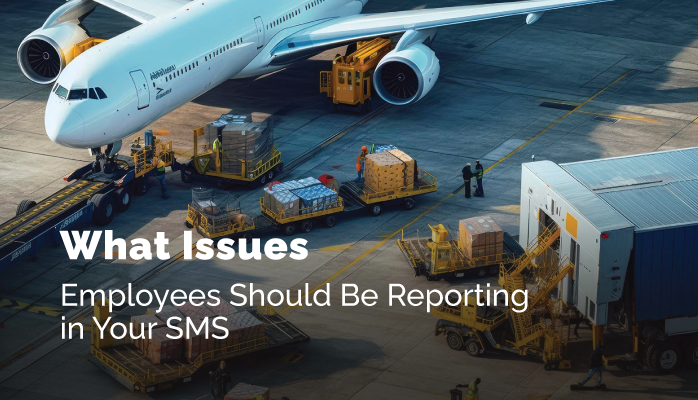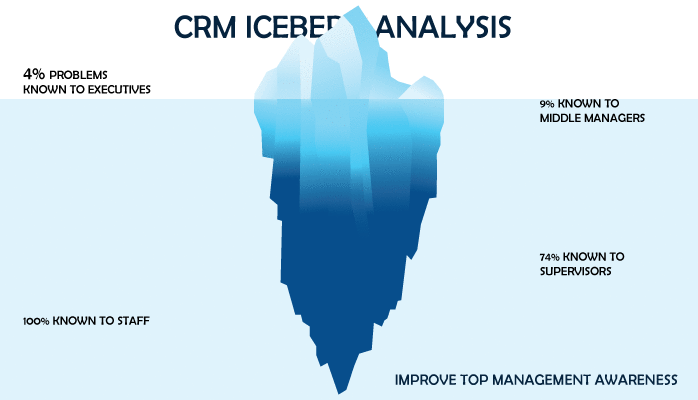Goals for Hazard Reporting

Knowing what issues employees should be reporting in your SMS requires you to always keep the primary goals of hazard reporting in mind:
First, you need to gather data. You use data to:
- Understand your SMS performance;
- Monitor effectiveness of risk controls;
- Mitigate safety concerns; and
- Know which issues are most relevant to your operations.
Second, you need to use that data to:
- Update the design of your SMS;
- Monitor trends;
- Classify reported issues; and
- Improve your SMS.
So, the primary goal of hazard reporting is to gather data in order to be aware of issues and improve your SMS.
Iceberg of Top Management Ignorance

Why is data so important in your SMS?
- Data is knowledge;
- The more data you have, the more knowledge you can have about your SMS; and
- The more knowledge you have, the better decisions you can make.
Despite this, most organizations suffer from a catastrophic lack of distribution of knowledge, which is summarized in the Iceberg of Ignorance graphic. This chart describes the fact that:
- Front-line employees have detailed knowledge of many issues, no matter how small; but
- As you move up the chain of command, that knowledge is less and less prevalent.
This means that top management is making decisions with a limited amount of knowledge, which is unacceptable. Top managers need to be aware of and have access to as much knowledge as possible.
Granting top managers access to knowledge starts and ends with how and what your organizations encourage employees to report. The more reports, the more potential knowledge.
Pyramid of Serious Safety Incidents
Similar to the Iceberg of Ignorance, the Pyramid of Serious Safety Incidents shows us:
- How that ignorance results in serious safety incidents;
- For every 1 serious incident;
- There are 59 minor incidents; and
- 600 identifiable conditions and precursors.
If management is not aware of these conditions and precursors. They can’t prevent minor incidents. If they are not aware of the minor incidents, they can’t prevent serious incidents.
The reality that the Iceberg of Incidents shows is that in many organizations top management is:
- Aware of only a few, if any, conditions; and
- Perhaps only aware of a handful of minor incidents.
This is often why serious safety incidents happen: decision-makers were not aware of critical data that could have prevented the occurrence.
What Issues Employees Should Be Reporting

The answer to granting top managers more knowledge is:
- Encouraging employees to report all concerns, even if they seem negligible.
The reaction most managers have to this is: it seems incredibly inefficient, and a waste of time, to include a bunch of potentially useless data in our SMS. This is incorrect thinking.
- ALL data has the potential to illuminate trends and expose danger;
- Setting this precedent of reporting establishes a fantastic reporting culture;
- With proper SMS tools, managing these “very minor” hazard reports is quick and easy; and
- Having a large amount of data provides top managers with a large pool of knowledge to make decisions with.
Nothing about these points is useless or inefficient. What is more inefficient are accident investigations, managing serious incidents, and recovering from serious incidents.
Encouraging employees to report even very minor concerns or conditions is a proactive approach to safety. It is a best practice of hazard reporting.
If employees don’t report minor incidents and conditions, your SMS is simply allowing detectable incidents to happen.
Benefits of Reporting All Concerns
Some major benefits of the “report everything” approach to safety are:
- Large knowledge base for making decisions;
- Top managers very involved in SMS;
- Lots of self-reporting vastly improves safety culture; and
- Strong ability to detect potential issues before they happen.
Related Articles on Aviation Safety Reporting
- 10 Great Reports to Monitor Safety Performance in SMS - With Examples
- How to Develop Healthy Safety Reporting Cultures in Aviation SMS
- How to Create Safety Reports for SMS Programs
Examples of Very Minor Incidents to Report
When we are talking about reporting all concerns, we are talking about reporting concerns that seem harmless.
Some examples are:
- Miss-counting tools
- If this is something that is continuously reported, it indicates a flawed process
- Most organizations would not report this because it seems harmless, but it could easily lead to an incident
- Forgetting to follow all steps in a procedure or checklist;
- Machines, equipment, tools, or stationary objects that aren’t working optimally or have “broken parts” (i.e., broken door knob); or
- Reporting sub-par teamwork interactions, strife with other employees, etc.
These points are the kind of concerns that many organizations will not report. But they are the kinds of “conditions” that can quickly escalate to more serious threats. If management is aware of them, they can take measures to fix them before anything notable happens.
Last updated March 2024.




